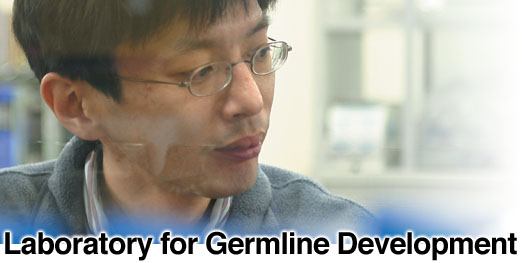





      |

Germ cells are the only cell types capable of transmitting genetic information across generations, and their formation is characterized by unique developmental processes as well. In many types of animals, including the Drosophila fruit fly, the formation and differentiation of germ cells is controlled by mRNAs and proteins localized in a specific cytoplasmic region within eggs, called germ plasm. Germ plasm mRNAs are translated in a spatiotemporally regulated manner, but the means by which the germ plasm is formed and regulates germ cell development remain largely unknown. Our research team studies the establishment of the Drosophila germ line as a model of the processes of germ plasm assembly and germ cell differentiation. We expect that our study will also provide insights into the general mechanisms of mRNA localization and translation, which are important to a number of other developmental processes including asymmetric cell division, cell migration and axis formation, and postnatal synaptic plasticity as well.
One area of interest is the mechanism of translational repression in germline development. In one example of this critically important form of regulation, the translation of the RNA for the maternal gene oskar, which functions in embryonic patterning and the formation of germline cells in Drosophila, is repressed during its transport to the posterior pole of the oocyte. We are now studying the function of proteins, such the recently identified factor, Cup, that regulates the repression of oskar translation during its localization to the oocyte posterior. In another, concurrent project, we are focusing on the roles of wunen2 and polar granule component (pgc), which are known to function in lipid signaling and global transcriptional regulation in germline cells during embryogenesis, respectively.
In addition to the study of fruit fly germline development, we are also beginning to undertake investigations using the ascidian, Ciona intestinalis. Our team will explore the genetic regulation of ascidian germline development by characterizing promoter regions of germline specific genes and trans-acting factors that regulate germline specific gene expression.